Monthly Archives: June 2021
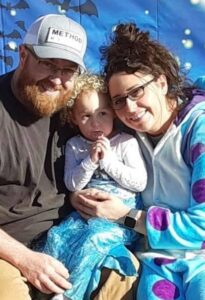
 Garrett’s life over the past few years has become more wonderful than he could ever have imagined. In 2016, he married the love of his life, Kayla and they were blessed with a beautiful little daughter named Elliott in 2018. Garrett has always loved children, and now with one of his own, he is so happy. Garrett and Elliott love to do things together, like mowing the lawn, hanging out by the pool, and going down the slide in the bouncy castle pool they rented for her birthday party.
Garrett’s life over the past few years has become more wonderful than he could ever have imagined. In 2016, he married the love of his life, Kayla and they were blessed with a beautiful little daughter named Elliott in 2018. Garrett has always loved children, and now with one of his own, he is so happy. Garrett and Elliott love to do things together, like mowing the lawn, hanging out by the pool, and going down the slide in the bouncy castle pool they rented for her birthday party.
This year, the most exciting thing that happened is that Garrett and Kayla took a trip to Cancun, Mexico to celebrate their birthdays, both of which are in June. They had a wonderful trip. They went golfing and rented a speed boat which Garrett thought was the greatest thing!! They relaxed and enjoyed the sun and the warm waters of the Caribbean,  and the many activities at the resort. One of the coolest things was when they found an elk picture at the resort. I don’t know of any elk in Mexico, but I suppose I could be wrong. As a hunter, Garrett found the elk picture a very cool thing. On this trip, they left Elliott first with her grandma, Alena Stevens and then the second half of the trip, her grandma Lynette Smiley took over. Elliott had a wonderful time too. Grandma time is always fun for kids…and it was a great way for Garrett and Kayla to celebrate their birthdays too.
and the many activities at the resort. One of the coolest things was when they found an elk picture at the resort. I don’t know of any elk in Mexico, but I suppose I could be wrong. As a hunter, Garrett found the elk picture a very cool thing. On this trip, they left Elliott first with her grandma, Alena Stevens and then the second half of the trip, her grandma Lynette Smiley took over. Elliott had a wonderful time too. Grandma time is always fun for kids…and it was a great way for Garrett and Kayla to celebrate their birthdays too.
Garrett usually has weekends off, unless they are really busy at EMIT Technologies, where he has worked since shortly after moving to Sheridan. He wants to play lots of golf and do lots of camping this summer. Garrett loves fishing too, so I’m sure some of their camping will be near rivers or lakes so fishing can be part of the fun. I’m 
 quite sure that before Elliott will become a great fisherwoman…following in her daddy’s footsteps. Elliott likes doing most things in her daddy’s footsteps, even though she is no tomboy. She is a princess, but her daddy’s stuff tops all duties of a princess.
quite sure that before Elliott will become a great fisherwoman…following in her daddy’s footsteps. Elliott likes doing most things in her daddy’s footsteps, even though she is no tomboy. She is a princess, but her daddy’s stuff tops all duties of a princess.
Yes, Garrett’s life took a dramatically wonderful turn back in 2016, because when he married Kayla, his future began. A future that has continued get brighter and brighter. I know that because their love for one another is very strong, they will continue to have wonderful things happen to them, and their life will become more and more wonderful every day. Today is Garrett’s birthday. Happy birthday Garrett!! Have a great day!! We love you!!

 Not everyone can handle the rigors of a remote mountain lifestyle, but my cousin Shirley Cameron has mastered them quite well. For most of her adult life she has lived off the grid…long before off the grid was cool. Shirley has been asked a number of times, why she still lives up there, often snowed in during the winter. Her answer is always the same, “I love my mountain.” I must admit that the top of the mountain, where Shirley lives with her grandson, Tyrel Cameron, is a beautiful place, with stunning views, but I don’t know if I could stand to live up there, so far away from civilization. Oh, I admit it is peaceful, and Shirley has made the yard quite beautiful. Her home is simple, not elaborate, but it works for her. The animals, who roam freely through her property, might be interesting, except for the occasional bear, which I would not like…no, not one little bit. Shirley even takes the bears in stride. I suppose that when you live around them, you know when to be outside and when not to. No matter how much work living off the grid, high on a mountain is, Shirley and her grandson, Tyrel have made it seem easy.
Not everyone can handle the rigors of a remote mountain lifestyle, but my cousin Shirley Cameron has mastered them quite well. For most of her adult life she has lived off the grid…long before off the grid was cool. Shirley has been asked a number of times, why she still lives up there, often snowed in during the winter. Her answer is always the same, “I love my mountain.” I must admit that the top of the mountain, where Shirley lives with her grandson, Tyrel Cameron, is a beautiful place, with stunning views, but I don’t know if I could stand to live up there, so far away from civilization. Oh, I admit it is peaceful, and Shirley has made the yard quite beautiful. Her home is simple, not elaborate, but it works for her. The animals, who roam freely through her property, might be interesting, except for the occasional bear, which I would not like…no, not one little bit. Shirley even takes the bears in stride. I suppose that when you live around them, you know when to be outside and when not to. No matter how much work living off the grid, high on a mountain is, Shirley and her grandson, Tyrel have made it seem easy.
You might be wondering what they do during those long winter months. Shirley had a huge library of books and she does a lot of reading. Her favorites are westerns like Zane Gray and Louis L’amour. She loves getting on Facebook to connect with her many friends there. It’s so nice that internet can be anywhere now, or she would not be able to get online. That could make for a long winter, if she is snowed in. Even having her grandson with her, Shirley would need to be comfortable in her own skin, because there is time she spends doing her own things, while Tyrel does his own things. You must be ok with alone time to be comfortable with that.
Shirley loves to cook, can, and make jelly…a large variety of jellies. When we last visited her, she sent us home 
 with jellies, and man…were they good. The meals we ate there were delicious. I suppose Shirley has had a lot of time to perfect her cooking skills. She knows what tastes good, and what will go with what. She and Tyrel even mix their own spices, and they are wonderful. They sent some home with us, so I know that for sure. Yes, Shirley has made living off the grid look easy, even though it is usually a lot of work. Today is Shirley’s birthday. Happy birthday Shirley. Have a great day!! We love you!!
with jellies, and man…were they good. The meals we ate there were delicious. I suppose Shirley has had a lot of time to perfect her cooking skills. She knows what tastes good, and what will go with what. She and Tyrel even mix their own spices, and they are wonderful. They sent some home with us, so I know that for sure. Yes, Shirley has made living off the grid look easy, even though it is usually a lot of work. Today is Shirley’s birthday. Happy birthday Shirley. Have a great day!! We love you!!
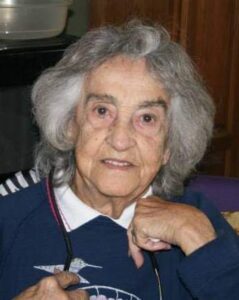
 My aunt, Virginia Beadle spent time out in nature with her family as a child when her dad, my grandpa, George Byer took the family out rock hunting, so she knew about snakes. In the years before her passing on November 29, 2019, at 89 years of age, Aunt Virginia lived with her son Steve Beadle and his wife, Wanda, and later with her son Bill Beadle and his wife, Janie. While she was living with Wanda and Steve, Aunt Virginia stepped out the front door of the house, and immediately back in. She told the boys that there was a rattle snake by the front door, and she said it was huge!! The boys thought she was a typical girl, afraid of any old snake. They said it was probably a garter snake. Well, it wasn’t a garter snake, and Aunt Virginia wasn’t a typical girl who was afraid of a snake. After Steve had killed the rattle snake and cut off his head and rattle, he measured the snake. Steve is 5’8″, and just holding the snake up, it hit the ground when Steve held it just under his chin. That is a big snake. I’m sure the boys believed that she knew a rattle snake when she saw one after that.
My aunt, Virginia Beadle spent time out in nature with her family as a child when her dad, my grandpa, George Byer took the family out rock hunting, so she knew about snakes. In the years before her passing on November 29, 2019, at 89 years of age, Aunt Virginia lived with her son Steve Beadle and his wife, Wanda, and later with her son Bill Beadle and his wife, Janie. While she was living with Wanda and Steve, Aunt Virginia stepped out the front door of the house, and immediately back in. She told the boys that there was a rattle snake by the front door, and she said it was huge!! The boys thought she was a typical girl, afraid of any old snake. They said it was probably a garter snake. Well, it wasn’t a garter snake, and Aunt Virginia wasn’t a typical girl who was afraid of a snake. After Steve had killed the rattle snake and cut off his head and rattle, he measured the snake. Steve is 5’8″, and just holding the snake up, it hit the ground when Steve held it just under his chin. That is a big snake. I’m sure the boys believed that she knew a rattle snake when she saw one after that.
Steve was reminded of a story his mom (my Aunt Virginia) told him. She was about 4 or 5 years old, and the family was living in a sod house. Aunt Virginia was outside playing and she saw a string of beads on the ground. She picked them up and went inside to has her dad, my grandpa, George Byer, if she could keep the beads. Her dad was shaving, and when asked, he told her yes, then thought maybe he should see what she was wanting to keep. When he looked down, he saw that she was holding a blue racer snake by the tail…and it was trying to bite her. He quickly grabbed it and stomped on its head. Aunt Virginia is pretty sure that is where her fear of snakes came from. Steve also said, “If Mom says it’s a big dang snake, it’s a BIG dang snake!!”

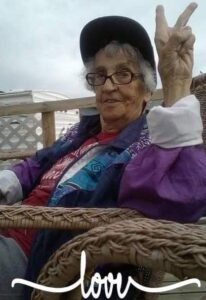
A few years ago, Wanda and Steve decided to lift Aunt Virginia’s spirits following her husband, my Uncle Bill’s passing. Aunt Virginia had told Wanda, during one of their many conversations, that she had always dreamed of a bedroom that was red and gray. She had wanted that bedroom all of her adult life. Without telling Aunt Virginia what they were doing, Wanda and Steve gave Aunt Virginia that bedroom that she had always dreamed of. She told them it was “too beautiful to sleep in” when she saw it. She never thought her dream would come true, but that day, with tears of joy streaming down her cheeks, Aunt Virginia saw the beautiful bedroom her kids had given her. That bedroom was their gift to her, but it was more than that…it was their love for her, and she knew that. She knew they loved her before that, of course, but to take a lifelong dream and make it a reality…well, she felt like a princess. And then there were the PJs. Aunt Virginia and Wanda loved their PJs, and I think that’s very cool.
Aunt Virginia had three little fur babies that she loved very much. Her idea of a wonderful way to spend time was to sit out on the deck, that had been beautifully furnished with new deck chairs with lots of padding and ottomans, as a gift for her birthday one year. Aunt Virginia loved sitting on the deck with the puppies, Molly, Whiskey, and Rosie…babies that she claimed for her very own. She sat on “her” deck with “her” puppies every chance she got. She would also sit under the covered pergola and do her puzzles. Wanda swore me to secrecy here, so don’t tell, but she did more sleeping than puzzling. Aunt Virginia went to heaven on November 29, 2019, and this past April, her little puppy, Rosie went to join her there. Rosie was the puppy that always 
 greeted Aunt Virginia in the hallway, every morning when she got up, and now Aunt Virginia got to greet Rosie when she went home too. Rosie was the one that greeted her in the hallway every single day when she got up. Rosie adored Aunt Virginia, and now they are together forever, and since Rosie’s birthday was yesterday and Aunt Virginia’s 91st birthday is today, they can celebrate together in beautiful Heaven style. Happy birthday in Heaven, Aunt Virginia. We love and miss you very much.
greeted Aunt Virginia in the hallway, every morning when she got up, and now Aunt Virginia got to greet Rosie when she went home too. Rosie was the one that greeted her in the hallway every single day when she got up. Rosie adored Aunt Virginia, and now they are together forever, and since Rosie’s birthday was yesterday and Aunt Virginia’s 91st birthday is today, they can celebrate together in beautiful Heaven style. Happy birthday in Heaven, Aunt Virginia. We love and miss you very much.
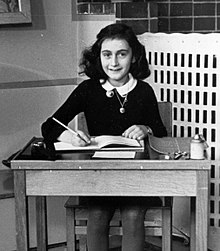
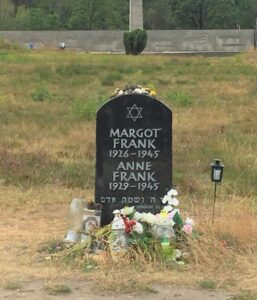 On June 12, 1942, Anne Frank, was a young Jewish girl living in Amsterdam. It was her thirteenth birthday, and as a gift, she was given a diary. Diaries have long been a big deal for girls. I know very few of those in my generation who didn’t have one. Most of those who received them, did little with them. I know that my diary (which I still have, by the way) contains mostly the gibberish of a young girl…mostly bored with the idea of journaling the meager events of my life…or at least that is how I saw them at the time. Looking back, I wish I had maybe taken the whole journaling/diary thing more seriously, because my life, while not as intense as that of Anne Frank, did have meaning, and those events that might have been considered important to my children, grandchildren, and great grandchildren have been, for the most part, lost to the forgetfulness of childhood.
On June 12, 1942, Anne Frank, was a young Jewish girl living in Amsterdam. It was her thirteenth birthday, and as a gift, she was given a diary. Diaries have long been a big deal for girls. I know very few of those in my generation who didn’t have one. Most of those who received them, did little with them. I know that my diary (which I still have, by the way) contains mostly the gibberish of a young girl…mostly bored with the idea of journaling the meager events of my life…or at least that is how I saw them at the time. Looking back, I wish I had maybe taken the whole journaling/diary thing more seriously, because my life, while not as intense as that of Anne Frank, did have meaning, and those events that might have been considered important to my children, grandchildren, and great grandchildren have been, for the most part, lost to the forgetfulness of childhood.
Many of us have heard of, read about, or seen the movie about the events of Anne Frank’s short life. One short month after receiving her diary, Anne and her family went into hiding from the Nazis in rooms behind her father’s office. Anne’s sister, Margot, received a call-up notice around 3pm on July 5, 1942. The Frank family had planned to go into hiding on July 16, 1942, but they decided to leave immediately so that Margot would not have to be deported to a “work camp.” The family left a false trail indicating that they had gone into hiding in Switzerland. According to Anne’s diary, Margot kept a diary of her own, but no trace of Margot’s diary has ever been found. This and her time in the hands of the Nazis was the main period of her diary, because as we know, Anne did not survive the Holocaust into which she and her family had been dragged. The hiding place was not discovered immediately, of course, and for the next two years, the Franks and four other families were hidden, fed, and cared for by Gentile friends. They lived in an annex, whose entrance was hidden behind a moveable bookcase. Following a tip in 1944, the families were discovered by the Gestapo. The Franks were taken to Auschwitz, where Anne’s mother died. Friends in Amsterdam searched the rooms and found Anne’s diary hidden away. They had hoped to save any personal items, so they could be returned to the family, should any of them survive.
Anne and her sister were sent to another camp, Bergen-Belsen, where Anne died a month before the war ended. Anne’s father survived Auschwitz, and after much soul searching, he published Anne’s diary in 1947 as “The Diary of a Young Girl.” The book has been translated into more than 60 languages. Had it not been for World War II, the Holocaust, and Anne’s tragic death from Typhus in the Bergen-Belsen concentration camp in February 1945, the diary would have most likely have been published, or even written in the way that it was. 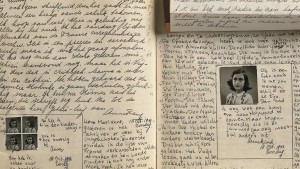
 The reality is that most diaries aren’t immensely interesting. Most are written by young girls with drama queen emotions, who are bored with their lives, because they are certain that nothing cool happens. Anne’s diary was interesting, because she wasn’t sure how long her life would be, and she wanted to know everything…before it was too late.
The reality is that most diaries aren’t immensely interesting. Most are written by young girls with drama queen emotions, who are bored with their lives, because they are certain that nothing cool happens. Anne’s diary was interesting, because she wasn’t sure how long her life would be, and she wanted to know everything…before it was too late.
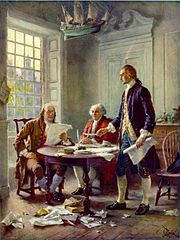 When the British Colonies, also known as the Thirteen Colonies or the early United States, were founded in the 1600s, the colonies were left to govern themselves for the most part. The land was really an expansion of power for Britain. Nevertheless, there were wars that took place in the new land and with them the costs of war, and because the colonies were owned by the British government, the cost of war fell on them. The cost of victory in the 1754 to 1763 French and Indian War and the 1756 to 1763 Seven Years’ War left the British government deeply in debt. The wars were fought in the colonies, but were equipped and populated with the British forces stationed there, at the cost of millions of British funds. The British government decided to impose The Stamp Act and Townshend Acts to pay for the wars, which provoked colonial opposition and unrest, leading to the 1770 Boston Massacre and 1773 Boston Tea Party. Then, came the Intolerable Acts, meant to punish the Massachusetts colonists for their defiance in the Tea Party protest in reaction to changes in taxation by the British Government, in spring 1774 upon Massachusetts. It was enough. These acts took away self-governance and rights that Massachusetts had enjoyed since its founding, and triggered outrage and indignation in the Thirteen Colonies, and twelve colonies sent delegates to the First Continental Congress, from September 5, 1774 to October 26, 1774. Their goal was to draft a petition to the King and organize a boycott of British goods. It was these acts…the acts that took away self-governance and other rights that triggered outrage and indignation in the Thirteen Colonies. We have often heard it called “taxation without representation” and it would never be tolerated. This nation had tasted freedom, and would never go back. These acts were key developments in the outbreak of the American Revolutionary War in April 1775.
When the British Colonies, also known as the Thirteen Colonies or the early United States, were founded in the 1600s, the colonies were left to govern themselves for the most part. The land was really an expansion of power for Britain. Nevertheless, there were wars that took place in the new land and with them the costs of war, and because the colonies were owned by the British government, the cost of war fell on them. The cost of victory in the 1754 to 1763 French and Indian War and the 1756 to 1763 Seven Years’ War left the British government deeply in debt. The wars were fought in the colonies, but were equipped and populated with the British forces stationed there, at the cost of millions of British funds. The British government decided to impose The Stamp Act and Townshend Acts to pay for the wars, which provoked colonial opposition and unrest, leading to the 1770 Boston Massacre and 1773 Boston Tea Party. Then, came the Intolerable Acts, meant to punish the Massachusetts colonists for their defiance in the Tea Party protest in reaction to changes in taxation by the British Government, in spring 1774 upon Massachusetts. It was enough. These acts took away self-governance and rights that Massachusetts had enjoyed since its founding, and triggered outrage and indignation in the Thirteen Colonies, and twelve colonies sent delegates to the First Continental Congress, from September 5, 1774 to October 26, 1774. Their goal was to draft a petition to the King and organize a boycott of British goods. It was these acts…the acts that took away self-governance and other rights that triggered outrage and indignation in the Thirteen Colonies. We have often heard it called “taxation without representation” and it would never be tolerated. This nation had tasted freedom, and would never go back. These acts were key developments in the outbreak of the American Revolutionary War in April 1775.
The Revolutionary War was not going to be a short war. It would rage from April 19, 1775 to September 3, 1783…eight long years. For seven years after the United States Declaration of Independence was adopted by the Second Continental Congress at its meeting in Philadelphia, Pennsylvania, on July 4, 1776, the war still raged on. I don’t suppose any nation would want to simply lay down its control, but the reality is that Britain had lost its control many years before, and it was time to cut their losses and go home.
It was on June 11, 1776, that the Continental Congress made the decision and selected Thomas Jefferson of Virginia, John Adams of Massachusetts, Benjamin Franklin of Pennsylvania, Roger Sherman of Connecticut and Robert R. Livingston of New York to draft our Declaration of Independence. That moment truly sealed the fate of the Britain ownership of this nation. The words they penned would be taught in schools, put on documents, t-shirts, decals, and many other forms of media. Because John Adams knew of Thomas Jefferson’s prowess with a pen, he urged him to author the first draft of the document, which was then carefully revised by Adams and Franklin before being given to Congress for review on June 28. I don’t know how many have ever read the entire Declaration of Independence, but I have chosen to place it in its unedited entirety, because I think we need to know why our founding fathers fought so hard for our independence. The 4th of July is not about picnics and fireworks, it is about freedom, and we must never forget that…nor the five men who wrote it and the entire congress who signed it.
The Declaration of Independence
“When in the Course of human events, it becomes necessary for one people to dissolve the political bands which have connected them with another, and to assume among the powers of the earth, the separate and equal station to which the Laws of Nature and of Nature’s God entitle them, a decent respect to the opinions of mankind requires that they should declare the causes which impel them to the separation.
We hold these truths to be self-evident, that all men are created equal, that they are endowed by their Creator with certain unalienable Rights, that among these are Life, Liberty and the pursuit of Happiness.–That to secure these rights, Governments are instituted among Men, deriving their just powers from the consent of the governed, –That whenever any Form of Government becomes destructive of these ends, it is the Right of the People to alter or to abolish it, and to institute new Government, laying its foundation on such principles and organizing its powers in such form, as to them shall seem most likely to effect their Safety and Happiness. Prudence, indeed, will dictate that Governments long established should not be changed for light and transient causes; and accordingly all experience hath shewn, that mankind are more disposed to suffer, while evils are sufferable, than to right themselves by abolishing the forms to which they are accustomed. But when a long train of abuses and usurpations, pursuing invariably the same Object evinces a design to reduce them under absolute Despotism, it is their right, it is their duty, to throw off such Government, and to provide new Guards for their future security.–Such has been the patient sufferance of these Colonies; and such is now the necessity which constrains them to alter their former Systems of Government. The history of the present King of Great Britain is a history of repeated injuries and usurpations, all having in direct object the establishment of an absolute Tyranny over these States. To prove this, let Facts be submitted to a candid world.
He has refused his Assent to Laws, the most wholesome and necessary for the public good.
He has forbidden his Governors to pass Laws of immediate and pressing importance, unless suspended in their operation till his Assent should be obtained; and when so suspended, he has utterly neglected to attend to them.
He has refused to pass other Laws for the accommodation of large districts of people, unless those people would relinquish the right of Representation in the Legislature, a right inestimable to them and formidable to tyrants only.
He has called together legislative bodies at places unusual, uncomfortable, and distant from the depository of their public Records, for the sole purpose of fatiguing them into compliance with his measures.
He has dissolved Representative Houses repeatedly, for opposing with manly firmness his invasions on the rights of the people.
He has refused for a long time, after such dissolutions, to cause others to be elected; whereby the Legislative powers, incapable of Annihilation, have returned to the People at large for their exercise; the State remaining in the mean time exposed to all the dangers of invasion from without, and convulsions within.
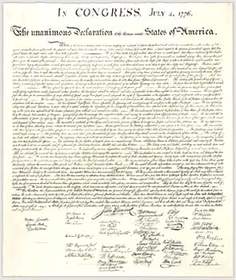
He has endeavoured to prevent the population of these States; for that purpose obstructing the Laws for Naturalization of Foreigners; refusing to pass others to encourage their migrations hither, and raising the conditions of new Appropriations of Lands.
He has obstructed the Administration of Justice, by refusing his Assent to Laws for establishing Judiciary powers.
He has made Judges dependent on his Will alone, for the tenure of their offices, and the amount and payment of their salaries.
He has erected a multitude of New Offices, and sent hither swarms of Officers to harrass our people, and eat out their substance.
He has kept among us, in times of peace, Standing Armies without the Consent of our legislatures.
He has affected to render the Military independent of and superior to the Civil power.
He has combined with others to subject us to a jurisdiction foreign to our constitution, and unacknowledged by our laws; giving his Assent to their Acts of pretended Legislation:
For Quartering large bodies of armed troops among us:
For protecting them, by a mock Trial, from punishment for any Murders which they should commit on the Inhabitants of these States:
For cutting off our Trade with all parts of the world:
For imposing Taxes on us without our Consent:
For depriving us in many cases, of the benefits of Trial by Jury:
For transporting us beyond Seas to be tried for pretended offences
For abolishing the free System of English Laws in a neighbouring Province, establishing therein an Arbitrary government, and enlarging its Boundaries so as to render it at once an example and fit instrument for introducing the same absolute rule into these Colonies:
For taking away our Charters, abolishing our most valuable Laws, and altering fundamentally the Forms of our Governments:
For suspending our own Legislatures, and declaring themselves invested with power to legislate for us in all cases whatsoever.
He has abdicated Government here, by declaring us out of his Protection and waging War against us.
He has plundered our seas, ravaged our Coasts, burnt our towns, and destroyed the lives of our people.
He is at this time transporting large Armies of foreign Mercenaries to compleat the works of death, desolation and tyranny, already begun with circumstances of Cruelty & perfidy scarcely paralleled in the most barbarous ages, and totally unworthy the Head of a civilized nation.
He has constrained our fellow Citizens taken Captive on the high Seas to bear Arms against their Country, to become the executioners of their friends and Brethren, or to fall themselves by their Hands.
He has excited domestic insurrections amongst us, and has endeavoured to bring on the inhabitants of our frontiers, the merciless Indian Savages, whose known rule of warfare, is an undistinguished destruction of all ages, sexes and conditions.
In every stage of these Oppressions We have Petitioned for Redress in the most humble terms: Our repeated Petitions have been answered only by repeated injury. A Prince whose character is thus marked by every act which may define a Tyrant, is unfit to be the ruler of a free people.
Nor have We been wanting in attentions to our Brittish brethren. We have warned them from time to time of attempts by their legislature to extend an unwarrantable jurisdiction over us. We have reminded them of the circumstances of our emigration and settlement here. We have appealed to their native justice and magnanimity, and we have conjured them by the ties of our common kindred to disavow these usurpations, which, would inevitably interrupt our connections and correspondence. They too have been deaf to the voice of justice and of consanguinity. We must, therefore, acquiesce in the necessity, which denounces our Separation, and hold them, as we hold the rest of mankind, Enemies in War, in Peace Friends.
We, therefore, the Representatives of the united States of America, in General Congress, Assembled, appealing to the Supreme Judge of the world for the rectitude of our intentions, do, in the Name, and by Authority of the good People of these Colonies, solemnly publish and declare, That these United Colonies are, and of Right  ought to be Free and Independent States; that they are Absolved from all Allegiance to the British Crown, and that all political connection between them and the State of Great Britain, is and ought to be totally dissolved; and that as Free and Independent States, they have full Power to levy War, conclude Peace, contract Alliances, establish Commerce, and to do all other Acts and Things which Independent States may of right do. And for the support of this Declaration, with a firm reliance on the protection of divine Providence, we mutually pledge to each other our Lives, our Fortunes and our sacred Honor.”
ought to be Free and Independent States; that they are Absolved from all Allegiance to the British Crown, and that all political connection between them and the State of Great Britain, is and ought to be totally dissolved; and that as Free and Independent States, they have full Power to levy War, conclude Peace, contract Alliances, establish Commerce, and to do all other Acts and Things which Independent States may of right do. And for the support of this Declaration, with a firm reliance on the protection of divine Providence, we mutually pledge to each other our Lives, our Fortunes and our sacred Honor.”
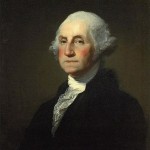
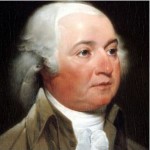 No country can truly be secure without an army, and the Thirteen Colonies (now the United States) was no different. After the beginning of the Revolutionary War, John Adams began to see the value of an army, so on June 10, 1775, he proposed to Congress, at a meeting in Philadelphia, that the men laying siege to Boston should be considered a Continental Army led by a general. The men who were mostly from New England, had armed themselves and rushed to surround British forces in Boston following the Battle of Lexington and Concord. Adams, who was representing Massachusetts, realized that the military effort would only succeed if the British thought the colonies were united. To achieve his united feel, Adams suggested than they appoint George Washington of Virginia, to command the Continental forces, despite the fact that New Englanders were used to fighting in local militias under officers elected from among their own ranks.
No country can truly be secure without an army, and the Thirteen Colonies (now the United States) was no different. After the beginning of the Revolutionary War, John Adams began to see the value of an army, so on June 10, 1775, he proposed to Congress, at a meeting in Philadelphia, that the men laying siege to Boston should be considered a Continental Army led by a general. The men who were mostly from New England, had armed themselves and rushed to surround British forces in Boston following the Battle of Lexington and Concord. Adams, who was representing Massachusetts, realized that the military effort would only succeed if the British thought the colonies were united. To achieve his united feel, Adams suggested than they appoint George Washington of Virginia, to command the Continental forces, despite the fact that New Englanders were used to fighting in local militias under officers elected from among their own ranks.
Five days later, on June 15th, Adams formally nominated George Washington as commander in chief of the Continental Army. Washington accepted the post on June 16th, and on June 17th, with no rest for the troops, the newly named army fought the Battle of Bunker Hill. John Adam’s wife, Abigail, and son, John Quincy Adams, watched the battle from their hometown of Braintree.
Just as the British had discovered the difficulties of waging war with rowdy and uncontrollable Yankees for soldiers during the Seven Years’ War, Washington was equally unimpressed when he met his supposed army. Just as the British had, he saw “stupidity” among the enlisted men, who were used to the easy familiarity of being commanded by neighbors. Upon arrival outside Boston, General George Washington organized this body of more than 22,000 men, known as the Main Army, into three divisions of two brigades each, promptly 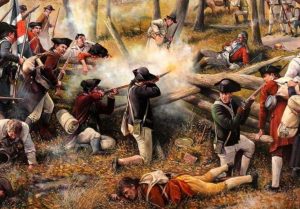
 insisting that the officers behave with decorum and the enlisted men with respect. Washington had some success with this first Continental Army, but when the New Englanders went home to their farms at the end of 1775, General Washington had to start fresh with new recruits in 1776. In retrospect, I’m sure Washington had better control over the second Continental Army, because they didn’t know any other leadership style. George Washington remained the commander of the Continental Army until the end of the Revolutionary War.
insisting that the officers behave with decorum and the enlisted men with respect. Washington had some success with this first Continental Army, but when the New Englanders went home to their farms at the end of 1775, General Washington had to start fresh with new recruits in 1776. In retrospect, I’m sure Washington had better control over the second Continental Army, because they didn’t know any other leadership style. George Washington remained the commander of the Continental Army until the end of the Revolutionary War.

 Following her graduation from the University of Wyoming, my niece, Kayla Stevens took a job at the Wyoming Mental Health Clinic in Sheridan, Wyoming. The job was a good starting point for Kayla. She started out in the Substance Abuse Team, but was later transferred to the Child and Family Team. While her jobs at the Wyoming Mental Health Clinic were fulfilling, Kayla truly found her home when she switched jobs, going with the Veterans Administration in Sheridan. The work with the Veterans Administration has truly been fulfilling, and recently even more so. Kayla just received a promotion with the Veterans Administration, and a nice raise, but the best bonus of all is that her new job will include working from home. Truly, what more could a mother of a young daughter ask than to stay home with her daughter while also continuing in her life’s work and at a great rate of pay. Plus, she and my nephew, Garrett won’t have to pay for daycare for their daughter, Elliott anymore. It is so hard on a mother to have to put their babies in the care of someone else to raise, even if you know and love the person caring for them. There is no substitute for a parent when raising a child. Now, Kayla can have the best of both worlds. Truly, it is a job sent from Heaven.
Following her graduation from the University of Wyoming, my niece, Kayla Stevens took a job at the Wyoming Mental Health Clinic in Sheridan, Wyoming. The job was a good starting point for Kayla. She started out in the Substance Abuse Team, but was later transferred to the Child and Family Team. While her jobs at the Wyoming Mental Health Clinic were fulfilling, Kayla truly found her home when she switched jobs, going with the Veterans Administration in Sheridan. The work with the Veterans Administration has truly been fulfilling, and recently even more so. Kayla just received a promotion with the Veterans Administration, and a nice raise, but the best bonus of all is that her new job will include working from home. Truly, what more could a mother of a young daughter ask than to stay home with her daughter while also continuing in her life’s work and at a great rate of pay. Plus, she and my nephew, Garrett won’t have to pay for daycare for their daughter, Elliott anymore. It is so hard on a mother to have to put their babies in the care of someone else to raise, even if you know and love the person caring for them. There is no substitute for a parent when raising a child. Now, Kayla can have the best of both worlds. Truly, it is a job sent from Heaven.
Recently Kayla and Garrett had a chance to have a little getaway to Cancun, Mexico, and their daughter, Elliott is getting some one on on time with her grandmas, Alena Stevens, who had Elliott the first half of the vacation, and Lynette Smiley, who has Elliott for the last half of the vacation. I am a firm believer of occasional parent trips, without the kids. These trips are like marriage renewal trips, and parents need that time to reconnect with their spouse in the ways they did before marriage…especially that whole dating thing. I am a firm believer of life long dating of your spouse. The couple who never stops dating their spouse will always stay in love. Finding ways to continually show your spouse how much they mean to you is the best way of expressing your love. The Cancun trip has been great for Kayla and Garrett, who have been married almost five years now.


Kayla is such a sweet person, and she has been a wonderful addition to our family. She loves kids and all the kids love her. She and Garrett make a perfect couple and great parents to Elliott. They are teaching her so much, including to have a great sense of humor. I am so glad that Kayla will be able to stay home with Elliott now, because Elliott will benefit so much. The future looks really bright for Kayla, and a work from home job will fit right in. Today is Kayla’s birthday. Happy birthday Kayla!! Have a great day!! We love you!!
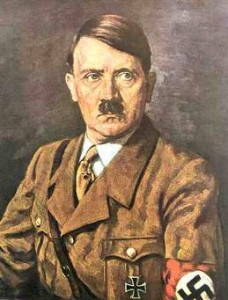
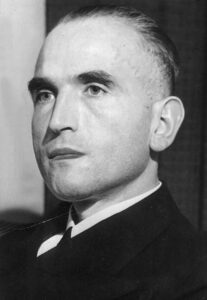 Not everyone was surprised at the coming murders of the Jews during the Holocaust. People hoped that the rumors were wrong, and that maybe they war would end before things got that bad, but most knew that if something wasn’t done, things were going to get ugly at some point. In the end, the non-Jews were forced to make a decision…take a stand, or stand by and watch millions of people die.
Not everyone was surprised at the coming murders of the Jews during the Holocaust. People hoped that the rumors were wrong, and that maybe they war would end before things got that bad, but most knew that if something wasn’t done, things were going to get ugly at some point. In the end, the non-Jews were forced to make a decision…take a stand, or stand by and watch millions of people die.
A Danish ambulance driver in Copenhagen, Denmark huddled over a local phone book, circling Jewish names. He had heard that all of Denmark’s Jews were going to be deported, and he knew this was his “moment of truth.” He knew he had to warn every one of these people, before it was too late. He wasn’t alone. Hundreds of everyday Danes sprang into action in late September 1943. They all had one collective goal in mind…to help their Jewish friends and neighbors escape the horrors they knew were coming.
The plan was amazing. Hundreds of people helped Jewish people sneak out of Copenhagen and other towns. They quickly headed toward Danish shores and into the crowded holds of tiny fishing boats. Denmark was about to pull off a spectacular feat…the rescue of the vast majority of its Jewish population. Within a few hours of learning that the Nazis intended to wipe out Denmark’s Jews, nearly all of the Danish Jews had gone into hiding. Within a few days, most of them had escaped Denmark to neutral Sweden. In the end, over 90% of the Danish Jews were snatched out of the hands of Adolf Hitler and his goons, and it was all thanks to ordinary Danes, most of whom refused to accept credit for their ations. I call it a miracle, and the participants…angels!!
The German forces invaded Denmark in April 1940. The Danish government, rather than suffer an inevitable defeat by fighting back, didn’t resist the Nazi hoard. Instead, the Danish government negotiated with the Germans to insulate Denmark from the occupation. In the negotiations, the Nazis promised to be lenient with the country, respecting its rule and neutrality…like they would ever keep that promise. By 1943, tensions had reached a breaking point. Workers began to sabotage the war effort and the Danish resistance ramped up their efforts to fight the Nazis. In response, the Nazis told the Danish government to institute a harsh curfew, forbid public assemblies, and punish saboteurs with death. The Danish government refused, so the Nazis dissolved the government and established martial law.
The Nazis had always been a forbidding presence in Denmark, but now they began really making their presence known. Like everywhere else, the Danish Jews were to be their first targets. The Holocaust was spreading across occupied Europe, and without the protection of the Danish government, which had done its best to shield Jews from the Nazis after realizing that the Nazi promises were worthless, Denmark’s Jewish population was in danger. In late September 1943, the Nazis got word from Berlin that it was time to rid Denmark of its Jews. As was typical for the Nazis, they planned the raid to coincide with a significant Jewish holiday…in this case, Rosh Hashanah, the Jewish New Year. Marcus Melchior, a rabbi, got word of the coming raid, and in Copenhagen’s main synagogue, he interrupted services. Melchior said, “We have no time now to continue prayers. We have news that this coming Friday night, the night between the first and second of October, the Gestapo will come and arrest all Danish Jews.” Melchior told the congregation that the Nazis had the names and addresses of every Jew in Denmark, and urged them to flee or hide.
Denmark’s panicked Jewish population sprang into action, but against all odds, so did its Gentiles. Hundreds of people spontaneously began to tell Jews about the upcoming action and help them go into hiding. It was, in the words of historian Leni Yahil, “a living wall raised by the Danish people in the course of one night.” It was amazing, and it can only be classified as a miracle. The Gentile people of Denmark were taking their lives into their own hands too, but they did not care, nor did they consider the cost. All they saw was the horrific injustice of the Nazi plan, and they could not abide by it.
No pre-existing plan had been put in place by the Danish people, but the Jewish people needed their help and nearby Sweden offered an obvious haven to those who were about to be deported. Sweden was still neutral and unoccupied by the Nazis, and they were a fierce ally. It was also close. Some areas of Denmark were just over three miles away from the Swedish coast. Once across, the Jews could apply for asylum there. The Danish culture has long been seafaring, in fact since Viking times. That said, there were plenty of fishing boats and other vessels to spirit Jews toward Sweden. But Danish fishermen were worried about losing their livelihoods and being punished by the Nazis if they were caught. So, rather than put their countrymen in peril, the resistance groups that swiftly formed to help the Jews managed to negotiate standard fees for Jewish passengers, then recruit volunteers to raise the money for passage. That way the fishermen got paid for their risk. The average price of passage to Sweden cost up to a third of a worker’s annual salary.
As often happens, there were fishermen who took advantage of the situation, but more who refused pay, acting without regard to personal gain. Boats were used for some 7,000 Danish Jews who fled to safety in neighboring Sweden. Passage was a terrifying ordeal. Jews gathered in fishing towns, hid on small boats, usually 10 to 15 at a time, giving their children sleeping pills and sedatives to keep them from crying, and struggled to maintain control during the hour-long crossing. Some boats, like the Gerda III, were boarded by Gestapo patrols. Gas came from strange sources. Careful rationing by groups like the “Elsinore Sewing Club,” a resistance unit, helped a few hundred Jews make the crossing.
There were failures sadly. In Gilleleje, a small fishing town, hundreds of refugees were being cared for by locals, when the Gestapo arrived. A collaborator had betrayed a group of Jews hiding in the town church’s attic. Eighty Jews were arrested. Others never got word of the upcoming deportations or were too old or incapacitated to seek help. In the end, about 500 Danish Jews were deported to the Theresienstadt ghetto. Of the 500 who were deported to the Theresienstadt ghetto, only 51 did not survive the Holocaust. Still, it was the most successful action of its kind during the Holocaust. Some 7,200 Danish Jews were ferried to Sweden.
The rescue was not without German help either. God can reach people even in such a corrupt government. Werner Best, the German who had been placed in charge of Denmark, apparently tipped off some Jews to the 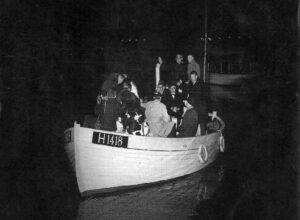
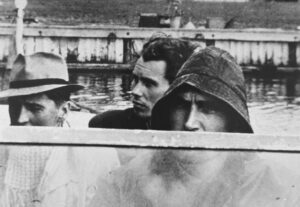 upcoming action and subtly undermined the Nazis’ attempts to stop the Danes from helping Danish Jews. Another helpful factor was that Denmark was one of the only places in Europe that had successfully integrated its Jewish population. Although there was anti-Semitism in Denmark before and after the Holocaust, the Nazis’ war on Jews was largely viewed as a war against Denmark itself.
upcoming action and subtly undermined the Nazis’ attempts to stop the Danes from helping Danish Jews. Another helpful factor was that Denmark was one of the only places in Europe that had successfully integrated its Jewish population. Although there was anti-Semitism in Denmark before and after the Holocaust, the Nazis’ war on Jews was largely viewed as a war against Denmark itself.

 We all have them. Days when we really miss a loved one who has passed away or even a love one who lives far away. These are days when thoughts of our mom, dad, spouse, sibling, child, grandparent, or even great grandparent, so fill our minds that it brings us to tears. We push through the sadness and try not to let the tears spill over, but it is so hard, because our heart has a mind of its own sometimes, and those tears just won’t listen to our pleas to stop. Reaching out to others does little to help us, and even posting on social media doesn’t help, because it is our own sadness, our own sorrow, and we have to live it alone. Truly, our only help comes from God, who sees our every tear, and has sent the Comforter to us for just such a time as this.
We all have them. Days when we really miss a loved one who has passed away or even a love one who lives far away. These are days when thoughts of our mom, dad, spouse, sibling, child, grandparent, or even great grandparent, so fill our minds that it brings us to tears. We push through the sadness and try not to let the tears spill over, but it is so hard, because our heart has a mind of its own sometimes, and those tears just won’t listen to our pleas to stop. Reaching out to others does little to help us, and even posting on social media doesn’t help, because it is our own sadness, our own sorrow, and we have to live it alone. Truly, our only help comes from God, who sees our every tear, and has sent the Comforter to us for just such a time as this.
The thing is that we know where our love one is, and that they are happy, but that doesn’t make it easier for us to move out of our own sadness, because the true sadness of losing someone is not sadness for them, but 
 rather for us. And for those who know someone who is going through this sadness, there is a feeling of helplessness. We love the grieving family member or friend, but we don’t have the words or the ability to make it better for them. All we can do is to pray over them and let them know we love them, and hope it is enough to ease their pain. Of course, for many of us, their pain is shared by us because we love both them and their loved one.
rather for us. And for those who know someone who is going through this sadness, there is a feeling of helplessness. We love the grieving family member or friend, but we don’t have the words or the ability to make it better for them. All we can do is to pray over them and let them know we love them, and hope it is enough to ease their pain. Of course, for many of us, their pain is shared by us because we love both them and their loved one.
No matter how painful those “miss you” days are, we must understand that they are also important, because we would never want to forget our loved ones. Their memory, while painful considering the loss, is so important considering our love for them. Unfortunately, once a loved one is in Heaven you can’t have one kind on memory without the other kind.
Missing the loved on who lives far away is different, but when you suddenly realize that it has been a year since 
 you saw that parent, grandparent, sibling, or child, your heart goes through that same pain and sadness. The heart somehow doesn’t fully understand the difference between a loved one being in Heaven and a loved on being across the country. Yes, the heart understands that the one who lives far away will be seen again on Earth, but it still feels that pain of missing that loved one terribly…especially when you had lived so close before, even in the same house. The heart just doesn’t totally understand the feeling, it just knows that it is painful, and it brings those dreaded tears. It’s all a part of “miss you” days.
you saw that parent, grandparent, sibling, or child, your heart goes through that same pain and sadness. The heart somehow doesn’t fully understand the difference between a loved one being in Heaven and a loved on being across the country. Yes, the heart understands that the one who lives far away will be seen again on Earth, but it still feels that pain of missing that loved one terribly…especially when you had lived so close before, even in the same house. The heart just doesn’t totally understand the feeling, it just knows that it is painful, and it brings those dreaded tears. It’s all a part of “miss you” days.
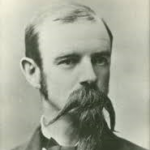
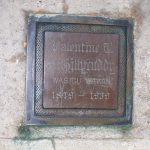
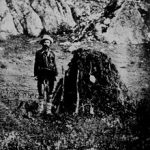 Valentine Trant O’Connell McGillycuddy was born on February 14, 1849 in Racine, Wisconsin to Irish immigrants Daniel McGillycuddy (1821–1892), a merchant, and Joana (Trant) McGillycuddy (1813–1892). His brother, Francis was 6 years older than he was. The McGillycuddy family moved to Detroit when Valentine was 13. At 20 years of age, McGillycuddy graduated from the Detroit Medical School. He began working as a doctor at the Wayne County Insane Asylum and practiced medicine for one year, a job that nearly drove him crazy…literally. Next, he began teaching at the medical college. His longstanding love for the outdoors eventually led McGillycuddy to leave the city medical field. At the request of Army engineer, General Cyrus Comstock, McGillycuddy surveyed and mapped the Great Lakes and Chicago’s devastation after the Great Fire. He probably could have stayed and continued working for the Army in the Great Lakes area, but his heart was in the West.
Valentine Trant O’Connell McGillycuddy was born on February 14, 1849 in Racine, Wisconsin to Irish immigrants Daniel McGillycuddy (1821–1892), a merchant, and Joana (Trant) McGillycuddy (1813–1892). His brother, Francis was 6 years older than he was. The McGillycuddy family moved to Detroit when Valentine was 13. At 20 years of age, McGillycuddy graduated from the Detroit Medical School. He began working as a doctor at the Wayne County Insane Asylum and practiced medicine for one year, a job that nearly drove him crazy…literally. Next, he began teaching at the medical college. His longstanding love for the outdoors eventually led McGillycuddy to leave the city medical field. At the request of Army engineer, General Cyrus Comstock, McGillycuddy surveyed and mapped the Great Lakes and Chicago’s devastation after the Great Fire. He probably could have stayed and continued working for the Army in the Great Lakes area, but his heart was in the West.
In 1875 he joined the US Geological Survey sponsored Newton-Jenney Expedition to the Black Hills. This trip would set the course for the rest of his life. Part scientific exploration, part treasure hunt, the expedition was fueled by the trip George Armstrong Custer made into the land of the Lakota and the reports of gold he brought back. Following that trip, McGillycuddy was appointed as the Army surgeon at Nebraska’s Fort Robinson and later administrator at Nebraska’s Red Cloud Agency in 1877. That appointment led to a friendship with Crazy Horse, and antipathy toward Red Cloud, both powerful leaders of the Dakota plains.
McGillycuddy had an uncanny knack for being at the right place at the right time, which put him right in the middle of things during the most consequential era of the American frontier. He met, treated, befriended, or opposed some of its most iconic figures including Little Big Horn principals, George Armstrong Custer, General George Crook, and Major Mark Reno, as well as Buffalo Bill Cody, Wild Bill Hickok, Calamity Jane Canary, the legendary Sioux chiefs Sitting Bull and American Horse, and John Wesley Powell…the man who mapped the Grand Canyon.
It also placed him squarely in the middle of a deadly struggle between the young upstart, Crazy Horse and the dominant chief of the Oglala Lakota, Red Cloud. The two were on different sides of just about everything. Crazy Horse resisted Anglo-American incursion at every turn, taking part in nearly every important battle including the Little Big Horn and the subsequent Dakota War. Red Cloud, who signed the 1851 Treaty of Fort Laramie, was deeply disappointed in the outcome. After having his own war named for him, Red Cloud’s War of 1866, he was finally willing to go along to get along. He and his band settled on the reservation, where he squabbled with Dr John J Saville, the government’s agency man.
McGillycuddy was at Fort Robinson when Crazy Horse surrendered in 1877. The move may have partially been prompted by his wife’s illness. McGillycuddy successfully treated Black Shawl. Some say she had tuberculosis and others claim it was cholera, which killed her three-year-old daughter. Whatever her ailment, saving her life brought about a close bond between Crazy Horse and the doctor. Six months after he surrendered, Crazy Horse was dead. Many people think he was assassinated, stirring a controversy that remains unresolved to this day. McGillycuddy spent the the wounded Crazy Horse’s last hours at his bedside. Varying accounts of the incident were provided by eye witnesses. Army Private William Gentles, an Irish immigrant soldier with a sketchy military career is a prime candidate for the killing of Crazy Horse, stabbing him with a bayonet. The Army’s retelling has Crazy Horse challenging the guards with two concealed knives as they attempted to lock him up, however. In the struggle, he fell on his own weapon. This version was attributed to Charging Bear, the real life “Little Big Man.” He is depicted as either a Crazy Horse lieutenant and “Shirt Wearer,” or a jealous rival who sought to curry favor with his Army captors. A number of Lakota genealogists lean heavily toward the latter, describing him as manipulative. He received a medal for his involvement in the incident.
McGillycuddy certified that his friend, Crazy Horse died near midnight on September 5, 1877, saying his killing “absolutely inexcusable.” Little Big Man was just part of the conspiracy. Crazy Horse was surrounded by shadowy characters. French and Lakota translator, William Garnett, thought that Little Big Man was the killer, but more than a dozen witnesses say an Army guard, perhaps Gentles, stabbed Crazy Horse. In the aftermath, Garnett was labeled a spy. Supposedly Garnett had no connection to Red Cloud, but Nellie Larrabee did. It was speculated that perhaps married to Crazy Horse, Larrabee, known as Chi Chi and Brown Eyed Woman, was sent to the Crazy Horse, Black Shawl household by Red Cloud. It was thought that she was there to act as a spy. Red Cloud was definitely not a fan of Crazy Horse. He thought his resistance to US forces was detrimental to the Lakota cause, but Red Cloud may have also been jealous of the attention the Army gave him. And then things got complicated. Red Cloud and Spotted Tail, a relative of Black Shawl, joined forces against the government’s attempts to seize tribal lands. Spotted Tail approved the Fort Laramie Treaty but continued to fight for sovereignty when the terms of the treaty were not met. Like Red Cloud, he believed it was a fool’s errand to oppose the government on the battlefield.
Along with Garnett, many Lakota deeply mistrusted Larrabee, calling her an “evil woman,” who helped lead Crazy Horse into a “domestic trap” that eventually caused his downfall and placed Spotted Tail in a Red Cloud conspiracy, as well. Others say Spotted Tail was unaware of any plot against Crazy Horse. After Crazy Horse died, McGillycuddy was named the Indian Agent on the Pine Ridge. His old enemy, Red Cloud had a hand to his downfall, accusing him of mismanagement and wrongdoing. A number of investigations were launched into the claims. Still McGillycuddy did his job, and amid charges of “tyranny” and fraud, he established a reservation police force and a boarding school. The breaking point came when the doctor was ordered to fire an otherwise blameless clerk. Rather than do so, he resigned his position in October of 1882 and moved with his wife Frances “Fanny” (Hoyt) McGillycuddy to Rapid City.
It was the end of an era. McGillycuddy served as Dean of the South Dakota School of Mines and Technology and was appointed South Dakota’s first State Surgeon. He was elected Rapid City mayor in 1897, but when Fanny died, he moved to California. Later, he married Julia Blanchard and enlisted at the start of World War I, serving Alaska and the western states during the 1918 Spanish Flu pandemic. His nemesis, Red Cloud, the last and one of the best known Lakota leaders, outlived nearly all of them. He died on the Pine Ridge Reservation, December 10, 1909 at 87 after converting to Christianity. He claimed the government had made many promises, but kept only one, saying, “They promised to take our land…and they took it.” There are 128 known photographs of Red Cloud, none of Crazy Horse, save a latter-day image found in a derelict photo studio in Chadron, Nebraska. It is still unverified. Black Shawl died in 1927, presumably of influenza. Helen “Nellie” Larrabee is believed to have died in about 1880. One source lists her burial in Charles Mix County near the present day Lake Andes, South Dakota.
Valentine McGillycuddy died on June 6, 1939, at the age of 90. Flags were lowered to half staff on the Pine Ridge at the news of his passing and his ashes were interred on Black Elk Peak in the Black Hills. Formerly known as Harney Peak, he had scaled the mountain as a young surveyor with the Newton-Jenney expedition. A simple stone monument reads “Valentine T. McGillycuddy, Wasicu Wakan, (Holy White Man) 1849-1939.” 
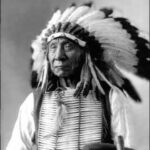
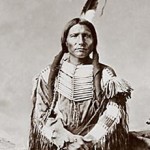 Valentine McGillycuddy’s grave site, Custer State Park, South Dakota, is accessible only by hiking trails, the most commonly used is Trail No. 9, from the Sylvan Lake Day Use Area. It is a site my husband, Bob and I have visited 15 times over the years. The three-mile hike through the ponderosa pine leads to the former fire tower atop what is now Black Elk Peak.
Valentine McGillycuddy’s grave site, Custer State Park, South Dakota, is accessible only by hiking trails, the most commonly used is Trail No. 9, from the Sylvan Lake Day Use Area. It is a site my husband, Bob and I have visited 15 times over the years. The three-mile hike through the ponderosa pine leads to the former fire tower atop what is now Black Elk Peak.

